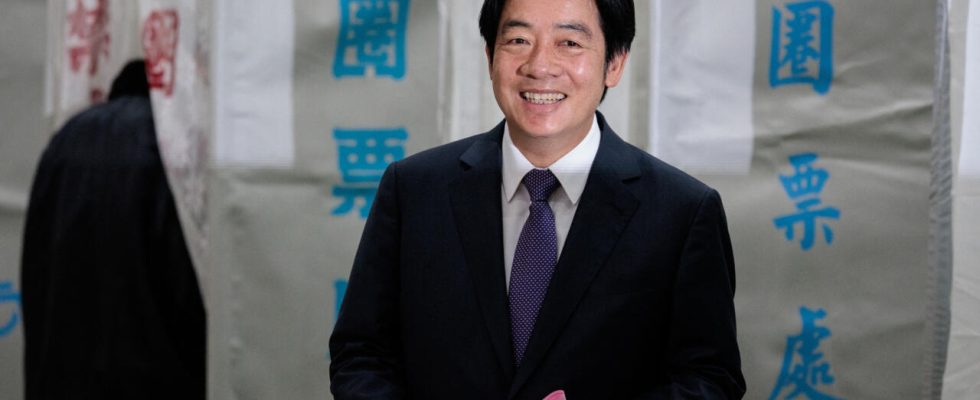Favorite of the ballot, Lai Chin-te, runner-up to outgoing President Tsai Ing-wen and decried by China as representing a “serious danger” to its interests, won the Taiwanese presidential election on Saturday, after a crucial vote in a context of growing tensions with Beijing.
Published on :
3 mins
The Taiwanese have chosen continuity. Lai Chin-te, vice-president of outgoing President Tsai Ing-wen’s Democratic Progressive Party (DPP), won the presidential election in Taiwan on Saturday, January 13.
At the start of the evening (local time), he and his running mate Hsiao Bi-khim, former representative of Taiwan to the United States, were credited with 40.5% of the votes, according to these official results covering more than 90% of polling stations. vote, while his main opponent Hou Yu-ih, candidate of the Kuomintang (KMT) obtained 33.2% of the votes.
All day, millions of people went to the polls to elect their next president in this territory of 23 million inhabitants regularly hailed as a model of democracy in Asia. Participation thus amounts to 60% according to local media – a clear decline, however, compared to the previous election, in 2020, which was close to 75%.
Chinese pressures
Favorite in the vote, the outgoing president’s heir apparent, however, had to carry out his campaign while suffering threats and pressure from Beijing. He is in fact considered the most “independant” candidate compared to his opponents – the Pekinophile Hou Yu-ih, candidate of the opposition party the Kuomintang (KMT) and Ko Wen-je, of the small Taiwanese People’s Party (TPP). ), presented as anti-establishment.
64-year-old doctor, son of a coal miner, graduate of Harvard University in the United States, the man who always presents himself under his British name William Lai entered politics in 1998. Elected mayor in 2010 from Tainan, a city in southern Taiwan, he joined Tsai Ing-wen’s government in 2017. Faithful to the posture of his predecessor, he defines himself as “a pragmatic worker for Taiwan’s independence”, a defender of its sovereignty and its multiple identity.
During his campaign, William Lai thus committed to strengthening the military defense of the island, while ensuring that he left the door open to exchanges and cooperation with China. “As long as there is equality and dignity on both sides of the Taiwan Strait, Taiwan’s door will always be open,” he said during a debate. This posture, however, led to him being presented by Beijing as a “troublemaker” and a “separatist”.
Tensions with Beijing have increased since Tsai Ing-wen came to power in 2016, with President Xi Jinping regularly displaying, in an offensive manner, his desire to reunify China and Taiwan – which he considers one of its provinces. And this position has been further strengthened as the elections approach.
All week, Beijing has increased its diplomatic and military pressure. On Thursday, five Chinese balloons crossed the median line separating the autonomous island from China, according to the Taiwanese Ministry of Defense, which also spotted ten planes and six warships. The same day as this show of force, Beijing called on Taiwanese voters to make “the right choice” while the Chinese army promised to crush any desire for “independence”.
Read alsoIn Taiwan, civil defense facing the taboo of Chinese invasion
The Taiwanese also voted to renew the 113 seats in Parliament, where the DPP could lose its majority. The results are expected in the evening.
With AFP

